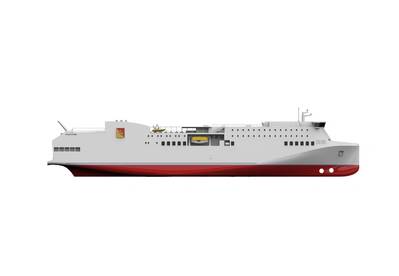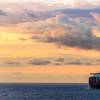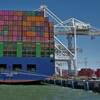"Made in Sicily": $126M RoPax Ferry Ordered
A new ferry, fully owned by the Sicilian Region and entirely "Made in Sicily", will carry out the connection service with Lampedusa and Pantelleria. The President of the Sicilian Region Renato Schifani and the CEO and General Director of Fincantieri Pierroberto Folgiero signed the contract for the construction of a new ferry (Ropax Class A), for a price of almost $126m.
“The signing of this contract represents a turning point for connections with the smaller islands of Sicily," said Schifani. "Ours is the first region in Italy to deploy the funds that the Ministry of Transport has allocated for sea connections and is the first to be the full owner of a ferry." He continued, saying it is with particular satisfaction "that the new unit will be entirely built in the Palermo shipyards."
“The award of this order represents an important test for Fincantieri," said Pierroberto Folgiero, CEO and General Manager of Fincantieri. "In an industrial sector that over time has moved to Asian shipyards, we have the opportunity to bring ferry production back to Italy, rehabilitate our historical skills in the sector and demonstrate the ability to be competitive while guaranteeing the highest production standards, with benefits in terms of operation and sustainability that will reach the end user. The strong point of our project are, once again, the technologies for reducing environmental impact, which intercept the needs of the energy transition, destined to outline the maritime transport sector of tomorrow".
The new ship 140m, 14,500-gt ship will be entirely built in the Palermo shipyard, will be delivered in 2026 and will serve the routes between Sicily and the islands of Lampedusa and Pantelleria. It will be designed for a maximum speed of 19 knots and a capacity of 1,000 people and 200 cars on board. The ship will be equipped with a dual fuel engine, diesel and LNG.
It will also have a photovoltaic system which, thanks to the accumulation of energy in a battery group, will guarantee a zero-emission stay in port for approximately four hours.














